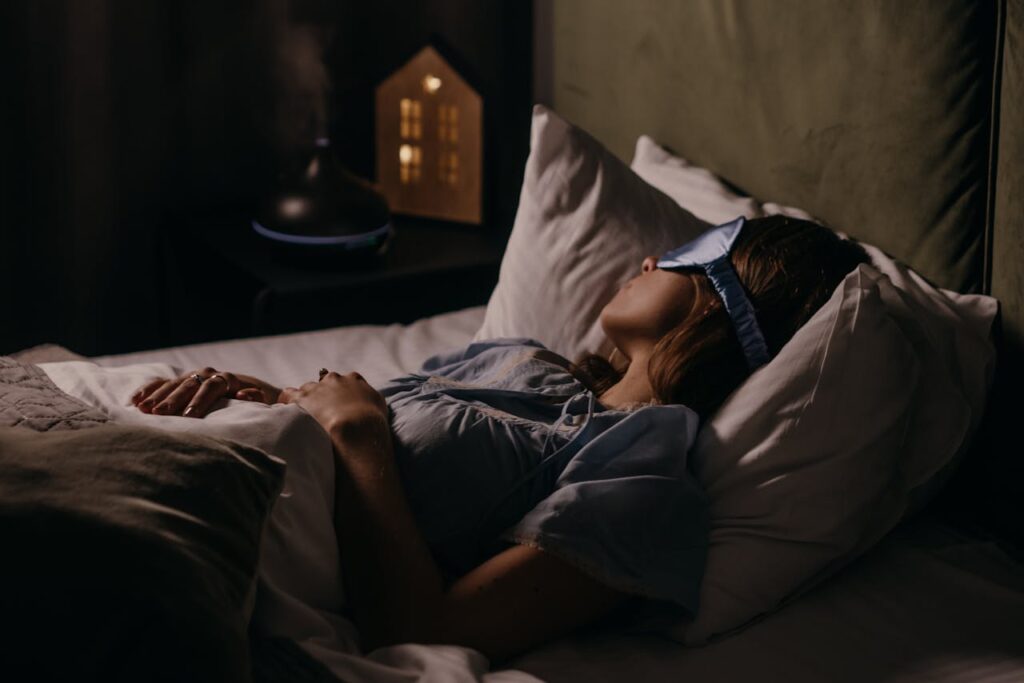
The Art of Falling Back Asleep: 7 Simple Steps
Waking up in the middle of the night is a common occurrence for many people. Whether it’s stress, discomfort, or an overactive mind, getting back to sleep can feel like a daunting task. However, with the right techniques and strategies, you can train your body and mind to fall back asleep effortlessly. In this guide, we’ll explore seven simple steps, including the power of breathing techniques, to help you reclaim your restful slumber.

- Acknowledge and Accept: The first step in falling back asleep is acknowledging that you’re awake without adding stress to the situation. Avoid checking the time, as it can increase anxiety about how much sleep you’re losing. Instead, accept the wakefulness calmly, knowing that it’s normal to have brief awakenings during the night.
- Practice Relaxation Techniques: Engage in relaxation techniques to calm your mind and body. One effective method is progressive muscle relaxation, where you tense and then release each muscle group in your body, starting from your toes up to your head. Combine this with deep breathing exercises to promote relaxation. Inhale deeply through your nose for a count of four, hold for seven counts, then exhale slowly through your mouth for eight counts. This technique, known as the 4-7-8 breathing method, helps activate the body’s relaxation response.
- Create a Comfortable Environment: Ensure your sleeping environment promotes relaxation and comfort. Keep your bedroom cool, dark, and quiet, and invest in a comfortable mattress and pillows. Consider using white noise machines or earplugs to block out any disruptive sounds. Additionally, avoid exposure to blue light from screens at least an hour before bedtime, as it can interfere with your body’s natural sleep-wake cycle.
- Mindful Distraction: Instead of ruminating on your inability to fall back asleep, distract your mind with calming activities. Practice mindfulness or meditation to shift your focus away from racing thoughts and onto your breath or a soothing mental image. You can also try listening to soft music or an audiobook with a calming narrator to help lull you back to sleep.
- Limit Stimulants and Nourish Your Body: Pay attention to your pre-bedtime habits and diet. Avoid consuming stimulants like caffeine and nicotine in the hours leading up to bedtime, as they can disrupt your ability to fall asleep and stay asleep. Opt for a light snack that combines complex carbohydrates and protein, such as a small serving of whole-grain crackers with cheese or a banana with almond butter, to help stabilize blood sugar levels and promote relaxation.
- Establish a Sleep Routine: Consistency is key when it comes to falling asleep and staying asleep. Establish a relaxing bedtime routine that signals to your body that it’s time to wind down. This could include activities like taking a warm bath, practicing gentle yoga or stretching, or reading a book in low light. Try to go to bed and wake up at the same time every day, even on weekends, to regulate your body’s internal clock.
- Seek Professional Help if Needed: If you consistently struggle with falling back asleep or experience chronic insomnia, consider seeking professional help. A healthcare provider can help identify any underlying medical conditions or sleep disorders contributing to your sleep disturbances and recommend appropriate treatment options, such as cognitive-behavioral therapy for insomnia (CBT-I) or medication.
Conclusion: Falling back asleep after waking up in the middle of the night doesn’t have to be a frustrating experience. By implementing the seven simple steps outlined in this guide and incorporating breathing techniques into your routine, you can train your body and mind to drift back into restful slumber effortlessly. Remember to be patient and consistent with your efforts, and don’t hesitate to seek professional help if you need additional support. With practice and perseverance, you can reclaim your nights of uninterrupted sleep and wake up feeling refreshed and revitalized each morning.
Sources:
- National Sleep Foundation. (n.d.). Relaxation techniques for better sleep. https://www.sleepfoundation.org/relaxation-relaxation-techniques-for-sleep
- Harvard Health Publishing. (2015, May). Relaxation techniques: Breath control helps quell errant stress response. https://www.health.harvard.edu/mind-and-mood/relaxation-techniques-breath-control-helps-quell-errant-stress-response
- Division of Sleep Medicine at Harvard Medical School. (n.d.). Twelve simple tips to improve your sleep. https://www.healthysleep.med.harvard.edu/healthy/getting/overcoming/tips


